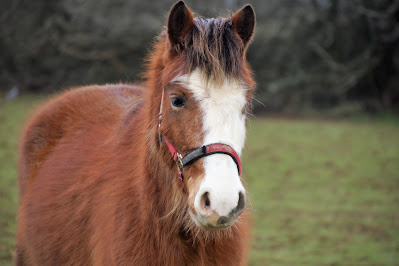 |
| We're not Welsh! |
At the weekend I was reunited with Julie for a rare outing to work with three Welsh Ponies. I had heard good things about the Hampshire Spirit Horse Rescue Centre and I know that a lot of my friends support them in one way or another. This charity fills a niche (rather a gaping hole) in the charity sector where the bigger charities are forced to concentrate on horrendous welfare cases. This charity takes those too but also accepts horses where the owners have become to ill to look after them. Even so, there is a limit on how much space and time the hard-working team and their volunteers can do.

It was obvious that Zoe had endless knowledge about how to bring round unhandled and semi-feral ponies but the Welsh ponies were testing her ability! By way of introduction we worked on slight changes to body-language which can make that vital difference. With field fencing, you always have to work with only the slightest pressure, and with consent, if your not to get into a mess. Fortunately, Cinders and Rhi, the youngest of the three Welsh ponies, were eager to engage even if they were shy.
By turning away in the "I am not worthy" pose, you can draw a pony towards you, especially if you remember to turn away in the direction that does not take your eyes along the pony's body.
And by using the back of your hand, fingers together, and a deeper touch - touching the soul not the skin - you can help the pony to register that the touch is pleasant, not tickly - especially when they live within electric fencing.
For the first time she allowed someone to touch her along her back.
Rhi was a different kettle of fish. Although she appeared to be feisty, rearing whenever she felt challenged, this soon stopped when we introduced a little bit of body language which simply put her off. Whilst Annalise's "No!" and a pointed finger were effective at keeping her away, slapping her coat was better at eliminating the behaviour altogether.
"No!" coupled with a strong gesture, is a word that ponies might learn means "Stop what you are doing", but there is a delay while the pony translates it. Slapping your coat surprises the pony with an uncomfortable sound, and makes them want to put their hooves back in the ground immediately so that their tummies are not exposed. It has to be gauged carefully as an aggressive, rather than a worried pony, might see that as an open invitation.
We also worked on the quality of touch. Whilst facial bones, seem to like a smooth one-finger stroke, most ponies don't like tickly, separate-fingered touch on their faces, or indeed the rest of their bodies. Again, by using the back of the hand, with a slightly deeper, fingers-together rub, I was able to touch Rhi's face in a way that was more acceptable to her.
After repeating this work, Annalise took things forward by working with the rolled up soft scarf, a precursor, hopefully, to being able to drop it down her neck.
We finished with the feather-duster which Rhi allowed around her face...
...and on her shoulder.
The great thing about both of these ponies is that they both 'give' you their head end, not because they have been forced to as in some methods of horsemanship, but through a little bit of trust. However, whilst Cinders is very open, Rhi is more closed, using her head to determine where you are allowed to go. The feather duster will allow us to get further along her body without being kicked.
There is no doubt that working in an open field, albeit small, is a challenge but Prince taught me that it is possible for ponies to come round in this way, although it could take far, far longer. Hopefully the tweaks we have made will help the team here to get over the barriers that were in their way.
Bruno, a three year old Welsh pony, has regressed to being wild over the last few months and when approached by humans he tends to run in circles around them. He seemed to be an ideal candidate for clicker-training and I sent Julie off to see if she could make contact with his lost soul through his tummy.
By starting this at a distance, introducing a quiet click and dropping a carrot baton on the floor, Julie was able to get his attention before his instinct to run was activated.
A bit nearer and rather intrigued...
And he seemed even more impressed when she got low to the ground.
As we are hoping to return very soon, this seemed the ideal time to end our introduction, knowing that the team can continue with the work we were doing.
Three ponies, all different, and needing three different but subtle approaches.
All of these ponies will be available for re-homing once they have reached a point at which a new owner is happy and capable of continuing with this work.






.JPG)

.JPG)









